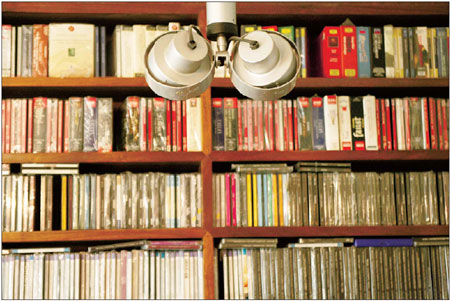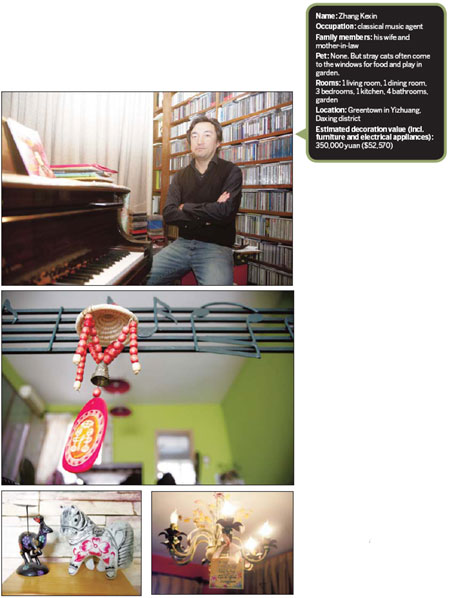Life and Leisure
Musical note
(China Daily)
Updated: 2010-12-13 11:05
 |
Large Medium Small |
 |
|
Zhang Kexin's compact discs are carefully wrapped and mentally |
 |
|
Clockwise: Zhang Kexin by the side of his 70-year-old Steinway baby grand. |
His life is music, and as one of China's top music agents, his work is music. But what about when he's home? Liu Yujie finds out.
Zhang Kexin used to live on Chang'an Avenue. Being right in the thick of things may suit some, but for Zhang, the noise and the pollution got to be too much. That's when he moved to Greentown, a Scandinavian-style estate in the suburb of southern Beijing. It's been six years now, but Zhang loves the quiet and peace. As pianist Chen Sa's agent, Zhang represents talent that stands right alongside Lang Lang and Li Yundi, the classical music celebrities that have moved not just China, but the world. Zhang himself is famous in his own right, as a celebrated radio deejay of classical music.
As you enter his home, the eye is drawn immediately to wrought-iron sheet music suspended above the head. To be more precise, these are the notes from the first bars of Schubert's Trout Quintet.
"It took the artisan time and effort to make each note, and arrange them in the right places," Zhang says.
The musical theme moves forward with four carved wooden chairs by the dining table which are obviously modeled after cellos. Zhang had fallen in love with them at first sight when he saw them in a bar. He hunted down the manufacturers and ordered a set for his home.
With a music-lover's keen aesthetic instinct, Zhang is the brains behind the whole dcor, and he knew exactly what kind of space, color, and lines he wanted. He also went to great lengths to find accents that have come from afar, with the best foreign pedigree.
A vast oil painting taking up a whole wall behind the sofa had its own story.
Rustic bungalows dominate the foreground, set against a pale blue stretch of water. Zhang first saw the original painting in a hotel in India and he was so entranced by the image that he had a photograph taken. Once he was back in Beijing, he sought the help of a fine arts teacher, and commissioned a replica. It took two- and-a-half days to put it up on the wall.
"I can't explain well why the scene appeals to me. Maybe it is that the image is neither too concrete nor too abstract. I love this ambiguity. At least you won't get bored," he says.
That's not the only thing he brought back from India. His frequent business trips there means he gets plenty of opportunities to collect unusual handicrafts. Some of these include crockery on the tea table, a watercolor at the turn of the corridor, a colorful striped carpet leading to the bedrooms and small tile paintings that line the rustic concrete walls of the bathroom.
Of course, there is also the refuge for the music lover, an audio room that fits like a shell on a snail. This is where Zhang hoards his music, a collection of about 25,000 CDs he started putting together in 1993. Many were bought abroad, some are second-hand CDs and LPs he picked up in Europe and at Taobao.com.
Obviously, two walls of shelves are not half enough to store them all, and many new arrivals pile up on the floor. But all are carefully wrapped and kept in very good condition, a task which Zhang personally oversees.
"I used to lend my CDs to other people. But I now only give them to people who really love music like myself, because I'm sure they will take good care of the music."
All the CDs are arranged according to labels, and then grouped by artists. Zhang is so familiar with each that he remembers exactly where each one is placed.
Most people's idea of a perfect audio-visual room is a collection of high-end speakers grouped around a comfy sofa. In Zhang's small audio room, though, except for two classic speakers and a rack disc players and amplifiers, there is no sofa and the walls are not acoustically treated. A pair of filmy white curtains shields the afternoon sunlight but still leave a square of orange on the wall.
"I stand and listen to music," Zhang says. This is between him and his music, and nothing comes between, let alone conventional ideas of comfort.
"I don't pay too much attention to the equipment. All I care about is the music itself. Good music is always pleasant, and bad music is noise even when it's turned down low."
To prove his point, Zhang puts on some music for us and guides us through the genres. We are a captive audience, and soon, we know he's right. Good music is captivating, and it may make you forget you are standing in a room with no chairs.
For Zhang, music is nourishing, and he looks much younger than his 42 years. His complexion is fair and his skin tender enough to make the young girls envious.
In his tranquil apartment, there is yet one more room where Zhang finds solace - the piano room. Guests are asked to take their shoes off and go barefooted on the spread of soft carpet. Behind the door, a weathered Steinway grand almost fills the room.
"This piano is more than 70 years old now, much older than me," Zhang says, resting his palms on it in an appreciative caress.